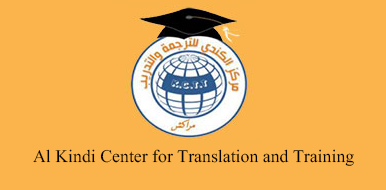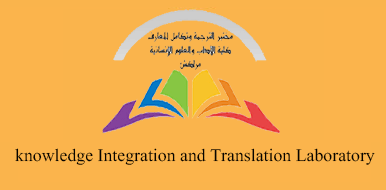Al Kindi Centre for Translation and Training
in collaboration with The Knowledge Integration and Translation Laboratory
(Cadi Ayyad University, Marrakech)
Organizes
An International Conference Under the Theme:
Pragmatic Meaning in the Arabic Linguistic Heritage:
Rooting Issues and Modernization Horizons
In honor of Dr. Rachid Belhabib
Date of Conference:17-18 April 2019
Preamble:
The true value of the scientific heritage of any nation rests upon the affluence of the cognitive accumulation of this heritage; alongside with its unique and distinguished outcomes, and the scope of the potentially promising scientific horizons that create a favourable environment for the coming generations to enrich this scientific heritage by means of additional contributions, adjustments and corrections.
In this respect, no one can deny the amount and the quality of knowledge that the ancient Arabs have accumulated in various cognitive specialties, notably inthe intellectual studies and scientific researches. The foremost of these researches are those related to linguistics, researches that have been nurtured by the focus of the ancient Arab scholars on meaning in terms of its nature, patterns, extrapolation mechanisms, and the way it is used in the essential texts that structure and built up their religious and worldly culture, such as the Holy Quran, the hadith (the prophetic tradition) as well as the various poetic and prose like accomplishments related to Arabic.
The topic of the pragmatic meaning in the Arabic linguistic heritage has a very long history and involves a wide range of manifestations in terms of approach, treatment as well as the cognitive and methodological backgrounds that are basically research oriented. This is evident in the grammarians’ interest in speech and the influence of the speaker on its production, as well as the receiver’s influence on its reception; the epistemologists’ understanding of the explicit and implicit meaning of the texts ofthe Holy Quran and Sunnah;and the exegetes concern with building the meanings of the fundamental (muhkam) and the allegorical (mutashabih) verses of the Holy Quran on the basis of its contextual meaning.In the same way, poetry commentators devoted attention to the poetic sense for concerted scientific and educational purposes. The rhetoricians, in their turn, devoted themselvesto different types of themes and rhemes, and to the meanings of grammar in the light of categories like: “Honesty and falsehood”, “appropriateness” and “rules of composition”. Likewise, poetry critics focused on the original and plagiarized poetic meaning,based on its relation to the poet’s aim or the rhymes of the poem.
Today, the truth is that the wealth of achievements of the Arabic linguistic heritage resides in the fact that many of its topics address issues whose questions go beyond the traditional scientific reality that produced them to explore the answers of modern science. This is what makes the issue of meaning within these traditional disciplines a pristinefield that is particularly amenable to re-reading from the premises of some modern scientific disciplines concerned with the subject of meaning, pragmatics in particular, which truly represents a fundamental station in dealing with the subject of meaning in human communication.
Scholars who have founded and expanded the field of pragmatics such as John Austin, JohnSearle, Paul Grice, Dan Sperber, and Deirdre Wilson gave unprecedented scientific attention to meaning and its basic communicative issues. Thisled to a thorough scientific anatomy of the fundamental tenets on which the exchange of meaning is based on within natural language in general. This includes the speaker, listener, purpose, context, relevance, cognitive environment, entailment and other procedural pragmatic concepts that have led the different generations of pragmatics scholars to conceptualize universal pragmatic topics such asspeech act, speaker’s meaning, sentence meaning, conversational implicature, and other fields of research that the ancient Arab linguists had already worked on using their own terminology,theoretical frames and goals.
Based on all what has been mentioned above, the conference “Pragmatic Meaning in the Arabic Linguistic Heritage: Rooting Issues and Modernization Horizons” invites researchers and interested people to discuss the theoretical and applied pragmatic dimensions of meaning in the Arabic Linguistic Heritage.
The conference research axes include, but are not limited to:
- The nature of the key concepts and terms of pragmatics in the Arabic linguistic heritage
- Fundamental Pragmatic Issues in the Arabic linguistic heritage.
- Special Pragmatic Models in the Arabic linguistic heritage.
- Theoretical frameworks of the pragmatic meaning in the Arabic linguistic heritage.
- Relationships between the Arabic Linguistic Heritage and Modern Pragmatics
- Pragmatic meaning in the Arabic grammatical tradition
- Pragmatic meaning in the Interpretations (Tafaseer) of the Holy Quran
- Pragmatic meaning in the Narrations of the Hadith of the Prophet (PBUH)
- Pragmatic meaning in the heritage of the Arabic epistemological studies.
- Pragmatic meaning in the explanations of Arabic poetry
- Pragmatic meaning in the traditional Arabic Critical Studies.
- Pragmatic meaning in the traditional Arabic Rhetorical Studies.
- Pragmatic meaning and the issues of sound in the Arabic linguistic heritage.
- Pragmatic Meaning and the issues of pragmatic interpretation in the Arabic linguistic heritage.
- Pragmatic meaning and the issues of argumentation in the Arab linguistic heritage.
- Prospects for innovation in the Arabic linguistic heritage based on modern research and pragmatic linguistic studies.
- Efforts of contemporary scholars in reading the pragmatic meaning in the Arabic linguistic heritage.
Important dates:
Deadline for proposal submission: July 30,2018.
Submission of final papers:November 15, 2018.
Notification of acceptance after blind reviewing: December 30, 2018.
Conference date: 17-18 April 2019.
Conference venue: Faculty of Arts and Humanities, Marrakech, Kingdom of Morocco.
Abstracts and participation formsshould be sent to: alkindiconference07@gmail.com.
Conference proceedings are to be published before the conference.
APA reference style required.
Participation fees $ 450 or equivalent (conference documents, participation certificate, accommodation, meals and coffee breaks are included).
Travel expenses to be covered by participants
Conference coordinators:
- Dr. Ibrahim Assikar – Morocco
- Dr. RachidAaradi – Morocco
- Dr. Noreddine Hanini – Morocco
- Dr. NoureddineAzmi – Morocco.
Scientific committee:
| · Dr. Abdelaziz Ait Baha (Morocco) | · Dr. Abdelali Majdoub (Morocco) |
| · Dr. Abdelkader Marah (Morocco) | · Dr. Abdelkader Bakcha(Morocco) |
| · Dr.Abdelouahed Lamrabet(Morocco) | · Dr. Abdellah Rachdi(Morocco) |
| · Dr. Abderrahim Boudlal(Morocco) | · Dr. Abdelwahed BnouYassir (Morocco) |
| · Dr. Ahmed Berrissoul(Morocco) | · Dr. Abderrahmane Boudraa(Morocco) |
| · Dr. Fatma Trassim (Morocco) | · Dr. Ahmed Kerroum(Morocco) |
| · Dr.Hassan Bouijelabn (Morocco) | · Dr. Fouad Bouali (Morocco) |
| · Dr. Mohamed Msaadi(Morocco) | · Dr. Hassan El Moudden(Morocco) |
| · Dr. Souad El koutoubia (Morocco) | · Dr. Mohamed Fathallah Misbah (Morocco) |
| · Dr. My Mustapha Abouhazim (Morocco) | |
Overall supervision
| Dr. Abdelhamid ZAHID | Knowledge Integration and Translation Laboratory – Morocco |
| Dr. Hassane DARIR | Al Kindi Centre for Translation and Training– Morocco |
Participation Form
| Full name | |
| Phone number | |
| Position and academic discipline | |
| Institution | |
| Participation axis | |
| Presentationtitle | |
| Abstract | |
| Bio data
|
|


